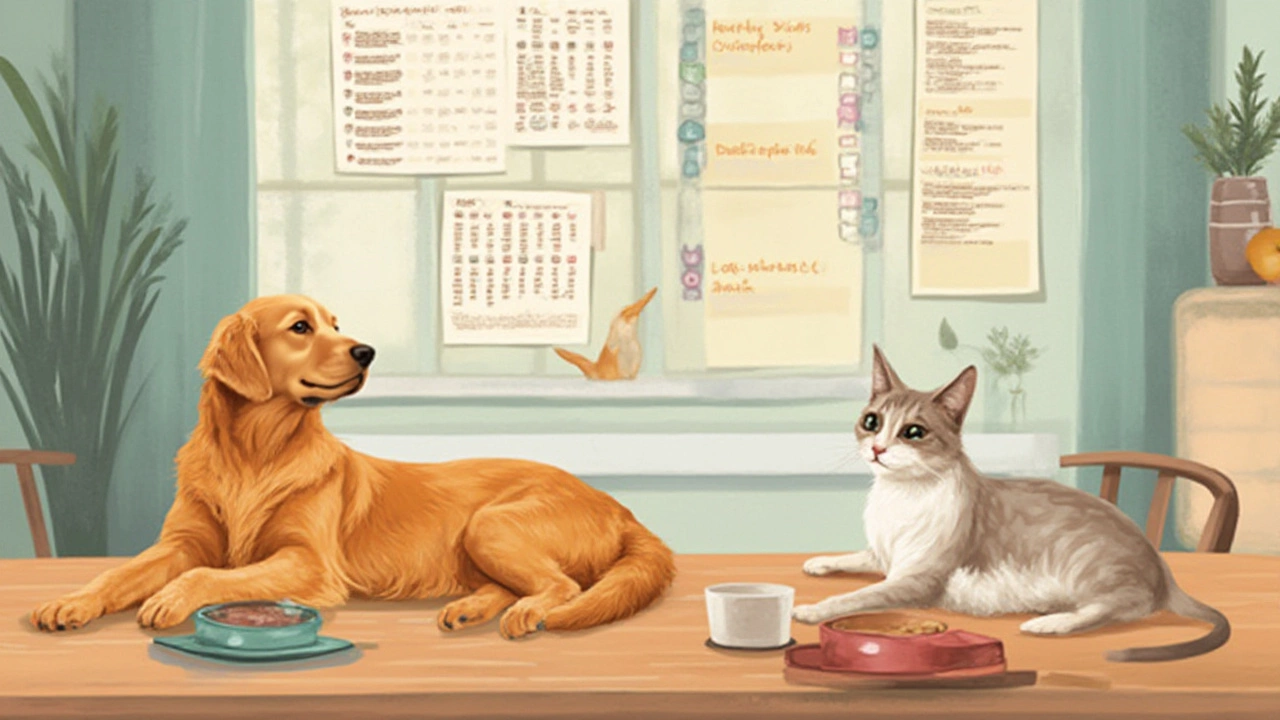Some pet owners worry way more about vaccines than their own annual checkup. The truth? Vaccines aren’t just a seasonal chore. They’re a powerful line of defense protecting our dogs and cats from scary diseases that can still strike, even here in 2025. Yet, ask five pet parents and you’ll get five answers about how often a pet should get vaccinated. Rabies, distemper, bordetella, panleukopenia—it starts to sound like a game of medical bingo. It’s time to clear the fog and talk straight: how often should you take your furry friend in for those shots? And what happens if you skip a year (or three)?
The Basics: Understanding Core and Non-Core Pet Vaccines
Before jumping into the nitty-gritty of timing, let’s sort out what kinds of vaccines exist and why. There’s no one-size-fits-all approach, but there are some rules that almost every veterinarian follows, whether you have a Great Dane or a sassy Siamese. Vaccines split into two camps: core and non-core. Core vaccines are those every dog or cat needs, no matter where you live, because the diseases they prevent are nasty, common, and often deadly. Non-core vaccines are more like the bonus round—they’re given based on your pet’s lifestyle, travel habits, and risk factors. For example, if you live in the heart of a city apartment, your dog may not need a Lyme disease shot, but if you’re hiking upstate every summer, it’s a different story.
For dogs, the main core vaccines include parvovirus, distemper, adenovirus, and rabies. Cats’ core vaccines usually mean panleukopenia (feline distemper), feline herpesvirus, calicivirus, and rabies. Non-core options range from bordetella (kennel cough) to feline leukemia, and more depends on exposure risk. Ever heard of leptospirosis or chlamydia? Those shots exist too, but aren’t strict must-haves for every critter. What you should note: rabies is often required by law for both cats and dogs in many places. If you skip it, you could face fines or struggle with international travel if you ever move with your pet.
So how do these vaccines work? They teach your pet’s immune system to recognize and fight off real threats, much like a rehearsal before the big play. It’s not just about exposure, but about safe, controlled exposure under vet supervision. Most vaccines today are either killed (inactivated), modified live, or recombinant (a little science magic that’s been huge in the last decade). And yes, side effects like soreness or a sleepy day do happen. But real reactions are rare—that’s not just marketing; that’s proven in every large-scale veterinary medical survey going back years.
Let’s bust a myth: annual shots for every vaccine are mostly a thing of the past. Scientific research, like the landmark studies by the American Animal Hospital Association (AAHA) and the American Association of Feline Practitioners (AAFP), shows that some vaccines protect for three years or more. Your vet’s favorite quote lately? "Only vaccinate as often as necessary, but always enough." It’s about finding a sweet spot between under-protection and overdoing it. That’s why even the best pet owners need a personal vaccine game plan, not just a generic sticker chart.

How Often Should Your Dog or Cat Be Vaccinated? Tailoring the Schedule
Okay, you know which vaccines exist—how about how often your pet needs those tiny jabs? There’s a science (and a bit of an art) to this. Puppies and kittens are like blank slates: they’re born with some immunity, but it fades fast, so they get a cluster of shots early, called the "puppy series" or "kitten shots." Usually, these start around six to eight weeks old and run every three to four weeks until about 16 weeks. Think of it as layering shields, one after another, while mom’s natural protection fades out. Usually, there’s a rabies shot in there too—but most places won’t let vets give it before 12 weeks.
Once your pet finishes that busy season of baby shots, you’re in maintenance mode. For most dogs and cats:
- Rabies vaccine: Almost always every 1 or 3 years, depending on your local laws and which vaccine is used. Many areas switched to 3-year rabies shots, but don’t count on it—always check with your vet.
- Core vaccines for dogs (distemper, parvovirus, adenovirus): After the puppy series and one booster at one year old, many of these move to every 3 years.
- Core vaccines for cats (panleukopenia, herpesvirus, calicivirus): Same deal; after kitten boosters and a 1-year-old booster, these often go to every 3 years.
- Non-core vaccines (like bordetella for dogs, feline leukemia for cats): Usually every year, but sometimes less, depending on risk.
This system isn’t just for comfort or to save money. Studies done in both the US and Europe have shown that spacing out vaccines as recommended can actually result in longer-lasting immunity and fewer side effects. The pet health field has learned a lot in the past 20 years—no more endless annual needles for the sake of it.
Still, some pets need more frequent vaccines. If you board your dog, go to dog parks, or do doggie daycare, annual “kennel cough” shots are standard practice. Got a barn cat or a cat that sneaks outside? Feline leukemia or FIV vaccines may move to yearly, especially if they meet unfamiliar cats. Even rabbits and ferrets (yes, people really vaccinate those nuggets) may have special schedules depending on disease trends.
Older pets sometimes fall through the cracks. People think senior pets can skip shots, but the reality is mixed. Their immune systems are slower, and some diseases, like rabies, don’t care how grey their muzzle is. On the flip side, if a cat or dog has chronic illness or is strictly indoors with zero access to new animals, your vet might hold off on some non-core vaccines. Never just stop vaccines on your own—talk it out with a vet who knows your pet specifically.
If you adopted a rescue or have missing vaccination records, don’t guess. Most vets recommend restarting the core series if there’s doubt, rather than playing immunological roulette. Some clinics now offer "titers," which are simple blood tests that check if your pet still has enough immunity from earlier shots. If the titers are good, you may skip an extra shot in some cases. But for rabies? No luck—by law, a current vaccine certificate is the only thing that counts.
Here’s a tip: Keep a record of every vaccine, not just a sticker in a random folder. If your pet ever travels, goes to daycare, or needs emergency boarding, you’ll be saved by your own detailed notes. Scan it, stick it in your cloud, email it to yourself—future you will thank you when paperwork chaos attacks.

Staying Up to Date: Why Consistency Matters and What Happens If You Miss
We’ve all seen those reminders from the vet—"Fluffy is due for vaccines!"—and sometimes, life gets in the way. But keeping your pet’s vaccines current really isn’t just about ticking boxes. Here’s the raw truth: missing vaccines doesn’t always lead to instant disaster, but it does throw up all sorts of risks more than people realize. Some vaccines (like rabies) have legal teeth. If your dog bites someone without a current rabies shot, you’re staring down quarantine or worse. Some boarding kennels, training classes, or even grooming salons flat out won’t take pets without stamped, up-to-date vaccine records. That’s the social headache; the health side is a lot scarier.
The best-known example is parvovirus in dogs. Miss a booster, and even adult dogs can get sick—fast. Parvo is still killing dogs across North America and Europe, especially in urban areas, and outbreaks pop up every summer. For cats, panleukopenia (a cousin to parvo) is just as brutal, especially in shelters. Rabies itself might seem like ancient history, but there are always a handful of pet exposures in the news, often from bats or wildlife. "My cat never leaves the house," people say, but all it takes is one open window and one stray bat. That’s not a scare tactic—it’s real cases, every year.
Maybe your pet skipped a year by accident. What happens next? Usually, you don’t have to backtrack to the full baby series unless a very long time has passed. But your vet will probably restart with two doses (a priming and a booster) if your pet missed the last recommended window by too much. Skipping out on the regular cycle can actually cost you more time and money, and—most importantly—puts your pet at genuine risk. Vaccines work best on a rhythm, so missing a beat can make them less effective and sometimes void the legal protection altogether.
It’s tempting to wait until your pet gets older to cut back on shots. But not all vaccines last a lifetime, and the immune memory can differ. Some dogs and cats have lifelong protection after a few boosters, but not every animal’s immune system works the same way, especially breeds with known immune quirks. Small dogs sometimes need different spacing from bigger breeds; cats with specific genetic lines may react differently. Science still doesn’t have every answer. Your vet makes educated calls using the latest guidelines, your pet’s age, and what’s happening in the local community.
One last thing that’s often forgotten: vaccines protect the herd—not just the individual. The more pets in a city or neighborhood are covered, the less chance there is of a major outbreak. Kids and adults with weak immune systems also count on this invisible wall. It isn’t only about rare diseases, either—kennel cough, for example, spreads in days through dog parks but quiets down fast when most dogs are vaccinated. Herd immunity isn’t just for humans, and the math works just as well with paws and claws.
So while it might be easy to roll your eyes at another postcard from your vet, think of it as a yearly handshake of trust. Following your pet's vaccination timeline is one of the most concrete, loving things you can do. If you’re ever unsure about a shot, a schedule, or whether your indoor cat needs anything more than rabies, there’s no harm in booking a chat with your vet. Most are happy to break down exactly what your pet needs and why—and the best clinics these days won’t push unnecessary shots. The result? A healthy, happy pet and one less worry on your never-ending list.
